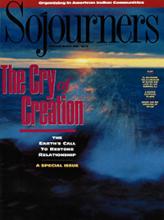In one short week in December 1989, Philippine President Corazon Aquino's political future suddenly turned bleak, and Philippine-U.S. relations were transformed.
Before the December coup attempt, Aquino repeatedly said that she was keeping her "options open" on whether or not to continue hosting the two biggest American military bases outside the United States. But as mutinous troops occupied several key installations in the country, bombed the presidential palace, and appeared to be on the verge of overthrowing her government last month, Aquino's options seemed to vanish as quickly as loyal soldiers defected to the mutineers. It took American fighter jets from Clark Air Base to save her government from collapsing; and this, to be sure, is now a crucial factor in determining the fate of the U.S. bases in the Philippines.
For the past two years, the Philippine and U.S. governments, as well as different pro-and anti-bases groups in both countries, have been gearing up for a major battle in the long debate over the U.S. military presence in the Philippines. The 1947 U.S. Military Bases Agreement, which covers Clark and Subic bases, is due to expire in 1991. The coming negotiations, which were supposed to start last December, have been postponed "indefinitely"--a word that presumably means early 1990.
Subic Naval Base is a major U.S. facility in the Pacific with nine separate commands. It is also the Seventh Fleet's primary port, training area, and logistics support base in the western Pacific. Clark Air Force Base is a principal link between the island base of Diego Garcia in the Indian Ocean and the outside world. More than 16,000 U.S. troops are stationed in the Philippines.
Read the Full Article
